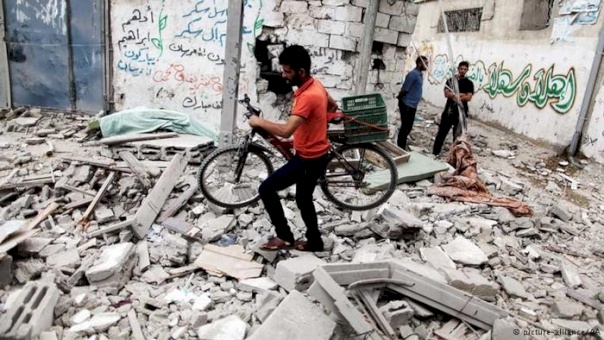
LONDON, (PIC)-- Corruption and Israel's tight blockade are some of the reasons for the delay in the reconstruction of the embattled Gaza Strip, the London-based Guardian newspaper said in a recent report.
Following 50 days of Israeli massive military attacks on already war-torn Gaza, its reconstruction is moving at "glacial pace" with only a very small amount of the pledged building materials so far delivered, according to the British newspaper's report.
It affirmed that amid mounting criticism of the slow pace of the rebuilding efforts, the UN-designed mechanisms to control the supply of building materials to Gaza and prevent them from falling into the hands of armed groups involved widespread corruption.
A report released by Oxfam this month, it said, warned that despite $5.4 billion in pledges at an international donor conference this year and an agreement between the Palestinian Authority, Israel and the UN to allow in building materials, a few truckloads of materials found its way into the Strip.
The Oxfam report added that only 287 such truckloads had entered Gaza in November, noting that "at this rate, reconstruction and development could take decades."
According to UN estimations, some 100,000 homes were damaged or destroyed in the last Israeli war, which affected more than 600,000 people in Gaza.
A large number of Gazans still have no access to piped water while everyone suffers from power cuts of up to 18 hours a day.
The mechanisms for allowing the entry of materials into Gaza, which were devised by UN special envoy Robert Serry, were aimed to dispel the Israeli government's fears that cement shipments would not be diverted to Hamas for military purposes, including the construction of tunnels.
However, the Guardian revealed that some people from the UN and international aid groups had expressed fears in-camera that the Serry's mechanisms, which involve inspection, registration and monitoring, was vulnerable to corruption.
"Despite promises that some 20,000 householders would qualify for help in rebuilding, the mechanism for that help has been hit by problems and controversy. Under the scheme, householders are assessed to see if they qualify for rebuilding materials, then registered and issued with a coupon allowing them to buy a specified amount of materials from warehouses monitored by a UN-administered inspection regime," the Guardian explained.
Recently, a reporter from the newspaper visited cement warehouses in Gaza and saw cement sacks being resold a few feet outside the warehouse doors at up to four times the cost within minutes of being handed over to householders with coupons.
Elsewhere, the Guardian heard allegations of officials taking bribes to produce coupons for more cement than the needs of householders, so the excess could be resold on the black market.
